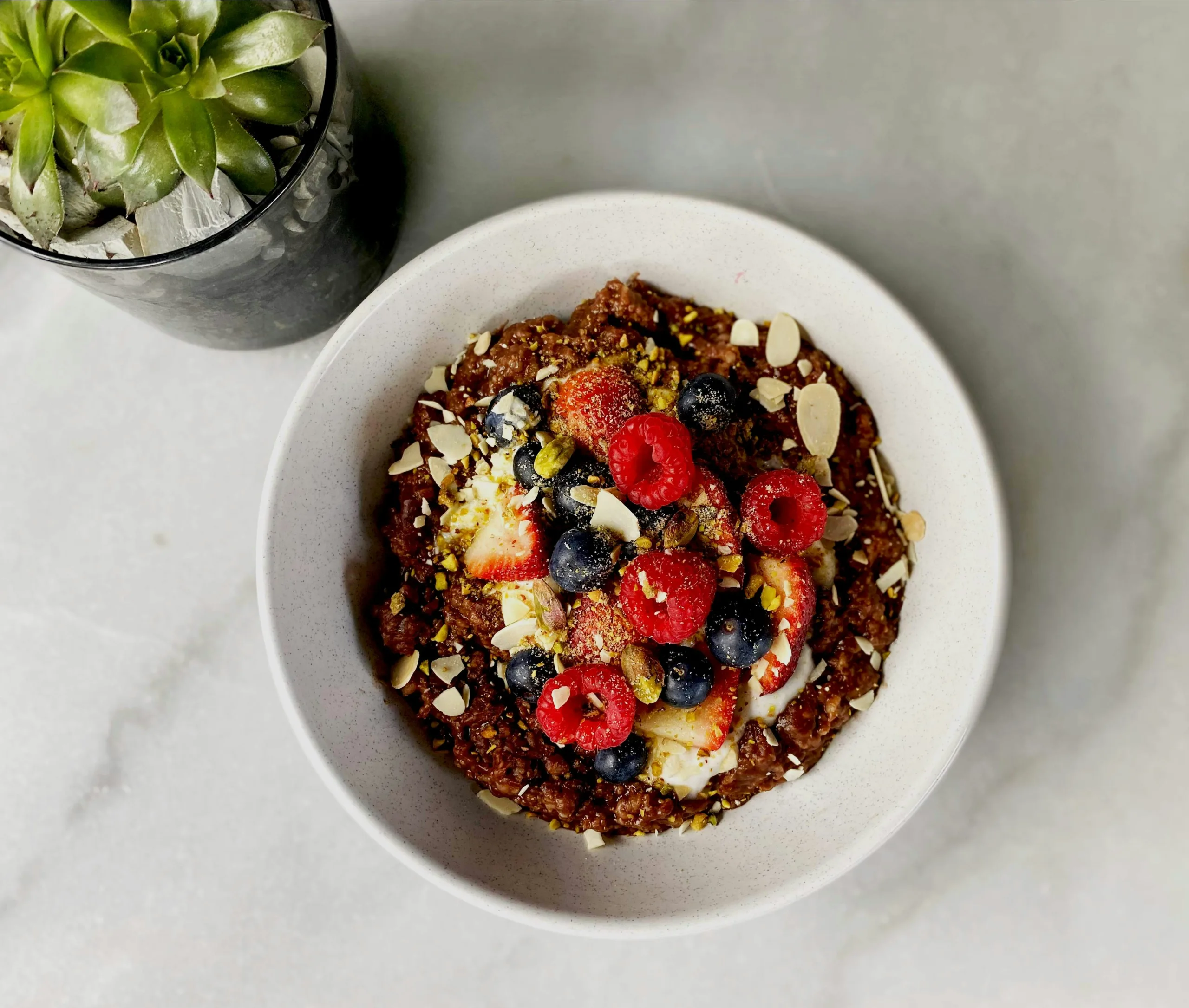WHAT IS KEFIR?
Kefir is made by fermenting milk (goat’s or cow’s) with kefir grains—these are not what you traditionally think of as grains—these grains are composed of bacteria and yeasts. Kefir is similar to yogurt, but uses different bacterial cultures. It has a creamy texture with a slightly sour taste. I recommend it to almost everyone as a way to consume fermented food. The healthy bacteria in kefir is famous for improving digestion, maintaining bone health, strengthening immunity and has even been shown to protect against certain cancers.
This tart, creamy drink has more (and a greater variety of) friendly probiotics than regular yogurt. You may be wary, but it really isn’t as creepy as it sounds. Here’s why you should start adding kefir to your diet.
WHAT ARE THE HEALTH BENEFITS?
Healthy Heart: Research has found that kefir has kefiran, a polysaccharide linked to lowering blood pressure and cholesterol.
Weight Loss: Kefir is a great source of protein (about 9 grams; more than an egg!) which helps us build muscle and satiates us longer aiding in weight management. It’s also loaded with B vitamins which plays a big role in metabolism and energy.
Digestive Support: Not to be too graphic, but kefir is a champ at, ahem, keeping one regular. That friendly bacteria can reduce flatulence, promote motility of the bowels and may offer relief to an upset tummy. According to the National Institute of Health, probiotics boost your digestive health by colonizing your gut with beneficial microorganisms that drive off other harmful bacteria. Kefir has over 35 different strains of beneficial bacteria and yeasts that actually colonize in the GI tract (yogurt can’t do this); so the benefits are long lasting well after you’ve finished your kefir smoothie. Rather than relying on an antidiarrheal or stool softener in your travel repertoire, try kefir. It just may work.
Strong Bones: Kefir is a great source of calcium and vitamin K, both of which are important for the development of strong healthy bones and reducing the risk of osteoporosis.
Boost Immunity: Research shows that eating probiotic-rich foods can elevate immunity by strengthening the intestinal lining (keeping that bad bacteria from getting into our bloodstream).
Protect Against Cancer: Probiotics such as kefir have a great potential for cancer prevention and treatment. A recent study found that some of the bioactive compounds of kefir, such as polysaccharides and peptides, have great potential for slowing down the growth of tumor cells in colorectal cancer, malignant T lymphocytes, breast cancer and lung carcinoma. Another in vitro study showed that kefir could reduce breast cancer cells by 56 percent, as opposed to yogurt which reduced the number of cells by 14 percent.
Lactose Intolerant Option: If you’re one of the 30 to 50 million Americans struggling with lactose intolerance, kefir may be a good option for you. The fermentation process removes most of the lactose from the milk, making it tolerable and digestible to most lactose-sensitive people.
HOW TO HAVE IT
It’s super easy to pick up single-serving containers or family size bottles at most supermarkets (right next to the yogurt). Adding kefir to your diet doesn’t need to take much effort.
You can use it instead of your usual yogurt or milk when blending a gut healthy smoothie.
Try it in overnight oats, drizzle on egg dishes at breakfast, or try this avocado kefir dressing as a healthy alternative to Caesar dressing.
To avoid added sugar, buy plain rather than flavored, and jazz it up at home if you want by adding a small spoonful of honey, cocoa powder, vanilla extract, or cinnamon.
In addition to traditional kefir, you can also find kefir water and kefir soda. While kefir water has yet to be the rage, I think it’s a dark horse waiting for its moment in the spotlight. If you’re feeling adventurous, try kefir soda which is a delicious anti-soda bubbly alternative.
MAKE IT YOURSELF
Making kefir is also simple to do at home. Take a cup of milk and add a teaspoon of kefir culture called “grain” to a glass jar. Cover and let it hang out on the counter for 24 hours. These grains are the equivalent to the scoby used to make kombucha. The healthy bacteria and yeast in the kefir grains will ferment the milk while transforming it into kefir. Strain the liquid, and it’s good to go.
And, you can reuse the grains, too! If you want to make more, just add the kefir grains back in a new cup of milk. Like a scoby, the grains will grow and multiply; you can discard them (or share with friends!). If you want to take a break, just put them in a cup of milk in the fridge.
Purchase kefir grains at whole food stores or online at Cultures For Health.
(photo credit: Shutterstock)






























